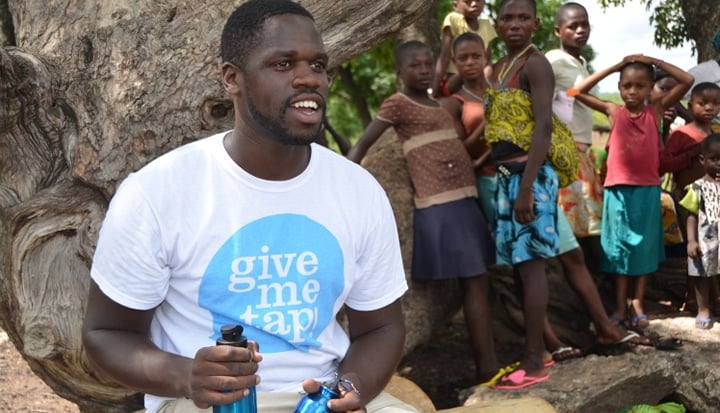With taps every few metres in most UK city centres, quenching your thirst with expensive bottled water can feel both unnecessary and unsustainable. The booming retail market for drinking water on-the-go has made asking for a free glass somewhat of a taboo. One young social entrepreneur is trying to turn the tide.
For 28-year old Edwin Broni-Mensah, the restricted drinking water availability in Britain became too hard to ignore. A fitness training programme during his time as a university student in Manchester made him aware of just how significant the problem was. He needed to drink 4 or 5 litres of water per day but had trouble filling his bottle on the go. “There are cafes everywhere, but unless I bought either bottled water or another product from them, they wouldn’t give me tap water”, he recalls. “You end up feeling awkward, much like when you have to sneak into McDonalds to use their toilet without buying anything.”
The irony of feeling thirsty while there’s plenty of taps around you was felt even stronger by Edwin when he reminded himself of his parents’ childhood stories. Growing up in their native Ghana, they dealt with the absence of clean drinking water on a daily basis. And here he was, in his own home country that boasts to have some of the best quality drinking water in the world – and he couldn’t get it whenever he wanted. There was only one option, says Edwin: to abandon his planned career in mathematics and become a social entrepreneur. “I knew I had to try and do something about it.”
A PhD Maths degree and a move to London later, Edwin has GiveMeTap up and running in over 30 cities, with the biggest presence so far in Manchester and the capital. The concept is simple: people buy a reusable stainless steel bottle from the online shop or a selected participating cafe and get free tap water at every store that signed up to the scheme. A free mobile app and bright blue window stickers point users to their nearest ‘tap’ point.
So far, Edwin has convinced 300 outlets to join the scheme. He admits that he regularly gets turned away by cafe owners for fear of losing valuable business, but a growing number tell him the opposite: that the scheme actually gains them new customers instead. “My mission is not to kill bottled water”, he insists. “There will always be a market for mineral water and that is fine. What we do is to try and serve another market alongside it.”
GiveMeTap aims at commuters, students, workers and others who take water with them as part of their daily routine. Eventually, the company wants to sign up ‘tap points’ within a 4-minute walk of any city centre location. Almost all London Underground stations in Zone 1 already have a ‘tap’ within 400 metres, providing an unofficial answer to Transport for London’s ‘Beat the Heat’ campaign to decrease the number of 750+ travellers who faint on the tube every year.
Ultimately, the scheme works because it fulfils a basic need for people and offers a business opportunity at the same time, says Edwin. “A huge number of people already bring a recycled bottle of tap water wherever they go. They wouldn’t go into a cafe to pay for one. But if they could come in to refill their bottle, they might end up buying something else.”
In addition to cafes, GiveMeTap is branching out to restaurant chains, including Pizza Hut and Byron Hamburgers. “A lot of restaurants already serve free tap water, so refilling our bottles simply means less dishwashing or plastic cup usage”, says Edwin. He estimates that 400,000 less plastic bottles have ended up in landfill as a result of GiveMeTap so far.
To further encourage sustainability and get more reusable, non-harmful and non-plastic bottles in the hands of people, Edwin is teaming up with corporates too. Earlier this year business advisory firm Deloitte purchased 12,500 company-branded GiveMeTap flasks to reduce the millions of plastic cups that are thrown away in its offices every single year. Plastic cup usage went down by 20 per cent within the first six months of usage.
True to his roots and social entrepreneurial spirit, Edwin is keen to make a social impact beyond the UK borders. For every two bottles sold, he promises that a person in Africa will get access to clean drinking water for life. He donates 70 per cent of the company’s bottle sales profits to water charities, who have already created boreholes and water pumps in Ghana, Namibia and Malawi.
Calling all young sustainability entrepreneurs! Unilever and Ashoka Changemakers are looking for the next generation of leaders. Do you have an inspiring solution? Enter it to the competition today.
This story was originally posted on Virgin.com and has been reposted with permission here.










